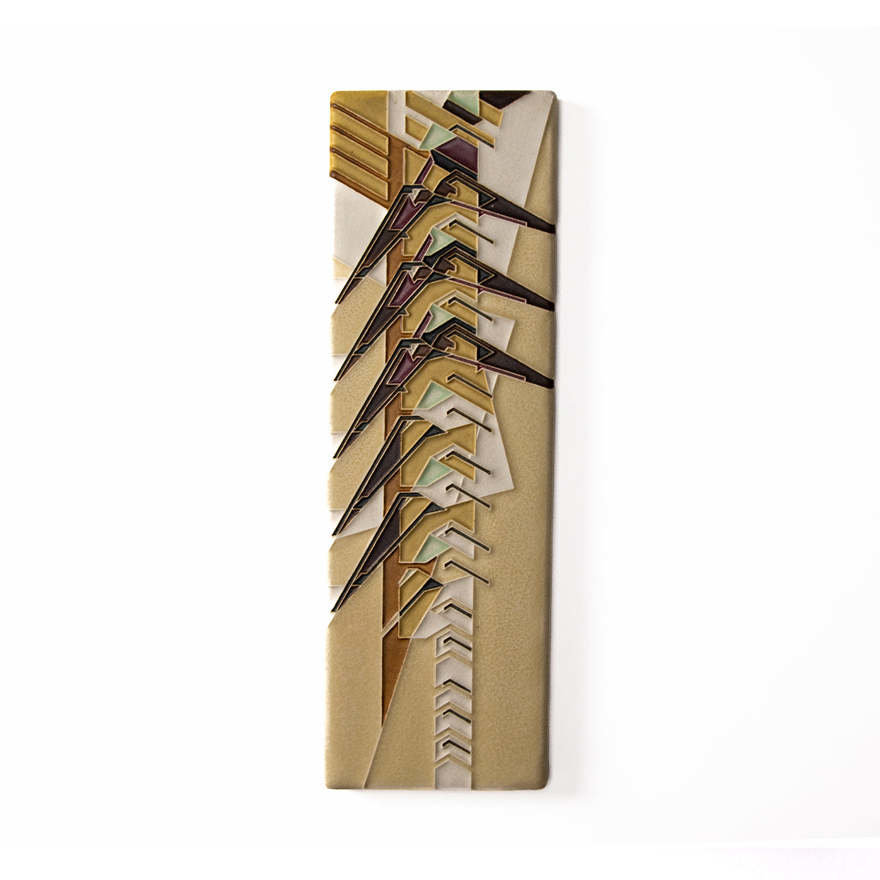Stunning Frank Lloyd Wright Art Tiles by Motawi Tileworks
A native Michigander, Nawal Motawi enrolled in the University of Michigan's Stamps School of Art & Design in the 1980s. After a year and a half, she dropped out "in disgust," she revealed in an interview with the Ann Arbor District Library. Motawi was turned off by the program's emphasis on self-marketing, and "I felt the critiques were a lot of baloney," she says. Motawi resolved to start over and study something else.

Motawi's father, an Egyptian immigrant and food scientist for Gerber, wasn't thrilled that Motawi had enrolled in art school in the first place. But her parents were less thrilled that she had dropped out. As they were footing the bill for her education, they laid down the law: "We're going to pay for college through this date. If you're still in school after that, you got to pay for it yourself." Motawi looked at the credits she'd amassed, then returned to finish her degree.
 8x8 Imperial Peacock - Turquoise
8x8 Imperial Peacock - Turquoise
 8x8 Imperial Peacock - Turquoise
8x8 Imperial Peacock - Turquoise
After graduating, Motawi got a job at Detroit's Pewabic Pottery, where she learned about both the intricacies of ceramic tile glazes and the Arts & Crafts movement. Following that and a residency at CCS, she resolved to start her own studio. Dithering or daunted, "I was thinking of trying to go back to school, and my dad said, 'Look, why don't you just start the thing?' My mom came up with this idea to buy a house and rent it to me on very reasonable terms…. They invested in real estate and rented to me, and I started the tile works in that garage."
Motawi began producing tiles of her own design and selling them at the Ann Arbor Farmer's Market. "I realized I didn't have a marketing budget, so I had to figure out how to sell them any way I could. The fee at the time was $11 per day. I started out just selling little Christmas ornaments made of clay, and I also had samples, just concept boards of layouts.
"Ann Arbor has a very art appreciating and affluent society, and that was very, very important [LAUGHTER] to my being able to start the business." Motawi's work caught the eye of a wealthy shopper named Cynthia, who was redoing her fireplace. Motawi invited her to her garage studio, pitched some ideas, and won the project.
"I did a fireplace for Cynthia, who lived in a brand new duplex on Fourth Street. [Her next-door neighbor] saw her place and said, I want Motawi for mine. I did a fireplace and a backsplash for her." That led to a photograph of Motawi and her brother Karim standing in front of the fireplace, in an article in the Ann Arbor News; in the 1990s, this was the closest you could get to going viral.
Motawi—who had repeatedly tried to get into the Ann Arbor Art Fair and been rejected—began to build her client base. Motawi Tileworks soon outgrew the 600-square-foot garage studio and moved, several times, into larger spaces. (Her parents sold the rental house and turned a profit.)
Today Motawi Tileworks has over 40 employees working out of a 12,900-square-foot facility in Ann Arbor. The company's handmade art tiles are distributed in over 300 locations in North America. The Motawi collection that most caught my eye are the ones you see pictured here. Motawi licensed the right to translate Frank Lloyd Wright's architectural motifs into ceramic art tiles.
Check out all of Motawi's Frank Lloyd Wright collection here. The company's other collections are also well worth a gander.
-
oFavorite This
-
QComment
K
{Welcome
Create a Core77 Account
Already have an account? Sign In
By creating a Core77 account you confirm that you accept the Terms of Use
K
Reset Password
Please enter your email and we will send an email to reset your password.






























